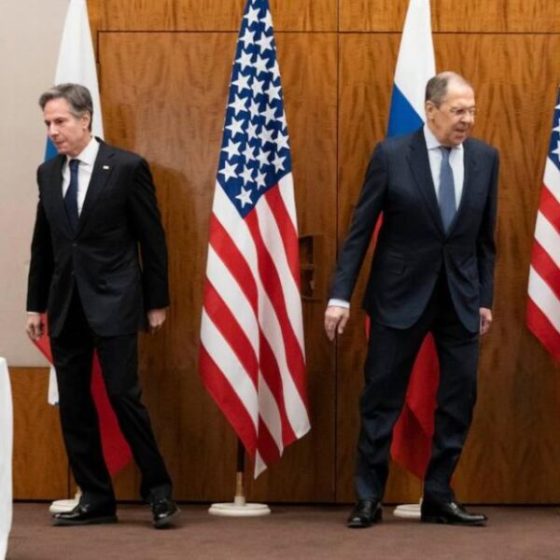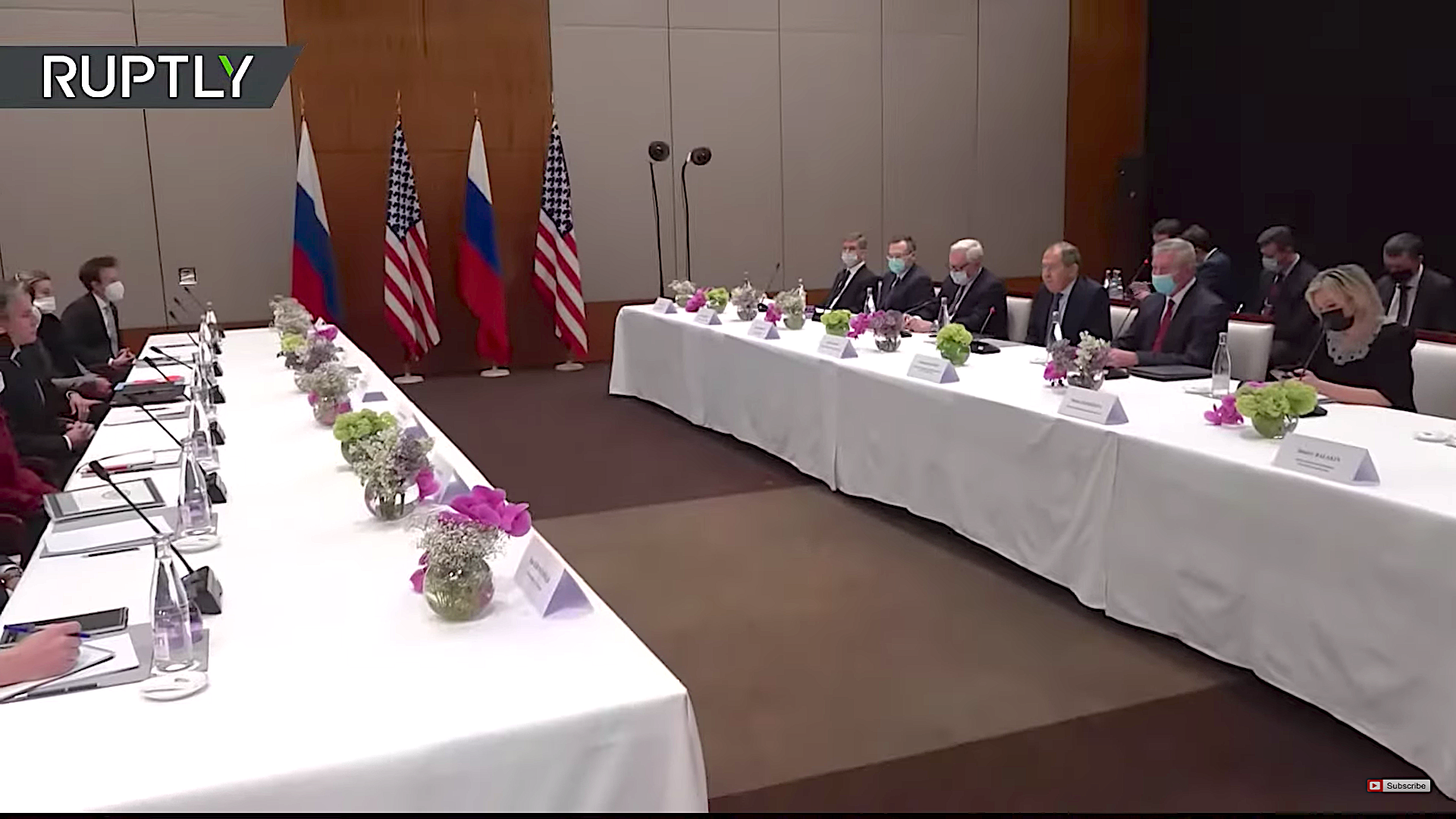
U.S. ‘Toolboxes’ Are Empty
By Scott RITTER
U.S. Secretary of State Antony Blinken met his Russian equivalent, Sergei Lavrov, in a hastily set up, 90-minute top in Geneva the other day, after which both sides lauded the meeting as worthwhile because it kept the door open for a diplomatic resolution to the ongoing crisis in Ukraine. What “keeping the door open” requires, however, represents two completely various realities.
For Blinken, the important thing seems process, continuing a dialogue which, by its extremely essence, develops the impression of development, with development being measured in increments of time, rather than outcomes.
A results-oriented outcome was not in the books for Blinken and his entourage; the U.S. was expected to send a written response to Russia’s demands for security assurances as defined in a set of draft treaties provided to the U.S. and NATO in December. Instead, Blinken told Lavrov the written submission would be supplied next week.
In the meantime, Blinken primed the pump of anticipated outcomes by highlighting the possibility of future negotiations that addressed Russian issues (on a mutual basis) relating to intermediate-range missiles and NATO military exercises.
But under no circumstances, Blinken said, would the U.S. be responding to Russian needs against NATO broadening to Ukraine and Georgia, and for the redeployment of NATO forces inside the territory of NATO as it existed in 1997.
Blinken also invested a significant quantity of time harping on the risk of an imminent military intrusion of Ukraine by Russian forces stated to be massing along the Ukraine-Russian border. He mentioned that any military incursion by Russia, not matter what size, that breached the territorial stability of Ukraine, would be viewed as a continuation of the Russian “aggressiveness” of 2014 and, as such, trigger “enormous repercussions” which would be damaging to Russia.
Blinken’s restatement of a position he has actually pontificated on incessantly for more than a month now was refrained from doing for the benefit of Lavrov and the Russian federal government, but rather for an American and European audience which had been left scratching their collective heads over comments made the day previously by President Joe Biden which recommended that the U.S. had a variety of options it would consider depending upon the size of a Russian attack.
“My guess is he [Russian President Vladimir Putin] will move in, he needs to do something,” Biden stated throughout a press briefing on Wednesday. While presenting a Russian intrusion as inescapable, Biden went on to keep in mind that Putin “will be held liable” and has “never ever have seen sanctions like the ones I promised will be imposed” if Russia were, in truth, to move against Ukraine. Biden mentioned deploying additional U.S. military forces to eastern Europe, along with undefined economic sanctions.
Biden then, nevertheless, hedged his remarks, noting that the scope and scale of any U.S. action would depend upon what Russia did. “It’s one thing,” Biden said, “if it’s a small incursion and we wind up needing to battle about what to do and refrain from doing.”
Nearly immediately the Washington facility went into overdrive to remedy what everyone said was a “misstatement” by Biden, with Biden himself making a new declaration the next day, stating that he had been “definitely clear with President Putin. He has no misunderstanding, any, any put together Russian systems cross the Ukrainian border, that is an invasion,” and that there need to be “no doubt at all that if Putin makes this choice, Russia will pay a heavy price.”
And just in case the President was not clear enough, Blinken reiterated that point following his Friday meeting with Lavrov.
Immutable The U.S. story about Russia and Ukraine was immutable; Russia was hell bent on attacking, and there would be enormous repercussions if Russia acted out on its intent. This was no idle risk, Blinken said, but rather represented the unified position of the United States and its allies and partners.
Or was it? In an informing admission, CNN’s White Home correspondent, John Harwood, mentioned that the “minor attacks” declaration by Biden was harmless, due to the fact that (Harwood said) Putin currently knew through sources that this was, in truth, the U.S. position. When it comes to Europe and Ukraine, their collective confusion and outrage was merely an act, a posture they needed to consider public intake, because the optics of Biden’s declaration “sounds bad.”
Simply put, the lack of an agreed-upon method on how to deal with a Russian incursion/invasion of Ukraine was an open trick for everybody except the U.S. and European publics, who being fed a line of horse manure to mitigate domestic political concerns over being seen as surrendering to Russian needs.
Biden and his administration are old hands at lying to the American public when it concerns matters of national security. One just need aim to Biden’s July 23, 2021, phone call with Afghan President Ashraf Ghani for a clear precedent into this inability to speak openly and honestly about reality on the ground. “I require not tell you,” Biden informed Ghani, “the perception around the world and in parts of Afghanistan, I think, is that things are not working out in terms of the fight against the Taliban. And there is a requirement,” Biden included, “whether it holds true or not, there is a requirement to predict a various picture.”
This, in a nutshell, is the essence of the posture taken by the Biden administration on Ukraine. Blinken has actually suggested that the U.S. has a tool kit filled with options that will deliver “huge repercussions” to Russia need to Russia invade Ukraine. These “tools” include military options, such as the reinforcement of NATO’s eastern flank with extra U.S. soldiers, and economic alternatives, such as shutting down the NordStream 2 pipeline and cutting Russia off from the speedy banking system. All these choices, Blinken notes, have the concentrated support of U.S. European allies and partners.
Public opening session in between Lavrov and Blinken on Friday. (Ruptly screenshot.)
The tool kit is all over, it seems– Biden has described it, as has White House Press Secretary Jen Psaki. Blinken has actually mentioned it on many celebrations.
There’s only one issue– the tool kit, it ends up, is empty.
While the Pentagon is supposedly dealing with a series of military alternatives to reinforce the existing U.S. military existence in eastern Europe, the actual execution of these alternatives would neither be timely nor even possible. One alternative is to move forces already in Europe; the U.S. Army keeps one heavy armored brigade in Europe on a rotational basis and has a light armored car brigade and an artillery brigade stationed in Germany. In addition to some helicopter and logistics support, that’s it.
Flooding these systems into Poland would be for display screen functions just– they represent an unsustainable combat force that would be ruined within hours, if not days, in any large-scale ground battle versus a Russian threat.
The U.S. can deploy a second heavy armored brigade to Poland which would fall in on prepositioned equipment currently warehoused on Polish soil. This brigade would suffer a comparable fate if matched up versus the Russian army. The U.S. can also deploy an airborne brigade. They, too, would die.
There are no other choices readily available to release additional U.S. heavy forces to Europe on a scale and in a timeframe that would be significant. The issue isn’t just the implementation of forces from their bases in the U.S. (something that would takes months to prepare for), but the sustainability of these forces once they showed up on the ground in Europe. Food, ammunition, water, fuel– the logistics of war is complicated, and not fixed overnight.
Simply put, there is no practical military choice, and Biden understands this.
Empty Sanctions Too The U.S. has no sanctions prepare that can make it through preliminary contact with the opponent, which in this case is the collective weakness of the post-pandemic economies of both Europe and the U.S.; the over-reliance of Europe on Russian-sourced energy, and the vulnerability of democratically chosen leaders to the whim of a consumer-based constituency. Russia can survive the impact of any sanctions program the U.S. is able to scrape together– even those targeting the Russian banking system– far longer than Europe can endure without access to Russian energy.
This is a truth that Europe lives with, and while U.S. policy makers might think hard-hitting sanctions look excellent on paper, the reality is that whatever passes for U.S.-European unity today would collapse in fast order when the Russian pipelines were shut down. The pain would not just be limited to Europe, either– the U.S. economy would suffer as well, with sky-high fuel prices and a stock exchange collapse that would put the U.S. into a financial recession, if not outright depression.
The political expense that would be incurred by Biden and, by extension, the Democrats, would be deadly to any hope that might remain for keeping either home of Congress in 2022, or the White House in 2024. It would be something if Biden and his nationwide security team were truthful and forthright about the genuine effects of stating the equivalent of financial war on Russia. It is another thing completely to speak just of the discomfort sanctions would trigger Russia, with little idea, if any, to the genuine effects that will be paid on the house front.
Americans should always remember that Russia has been laboring under serious U.S. sanctions given that 2014, with no effect. Russia knows what could be coming and has prepared. The American people indulge their lack of knowledge, believing at face value what they are told by the Biden administration, and echoed by a compliant mainstream media.
Propaganda About ‘Propaganda’
Among the fantastic paradoxes of the present crisis is that, on the eve of the Blinken-Lavrov meeting in Geneva, the U.S. State Department published a report on Russian propaganda, decrying the role played by state-funded outlets such as RT and Sputnik in shaping public opinion in the United States and the West (in the interest of complete disclosure, RT is among the outlets that I write for.)
The truth that the State Department would release such a report on the eve of a conference which is all about propagating the big lie– that the U.S. has a prepare for discouraging “careless Russian aggression”– while disregarding the difficult reality: this is a crisis derived exclusively from the reckless policies of the U.S. and NATO over the past 30 years.
While a compliant traditional American media unthinkingly repeated every caution and risk issued by Biden and Blinken to Russia throughout the past few days, the Russian position has actually been largely neglected. Here’s a pointer of where Russia stands on its needs for security assurances: “We are speaking about the withdrawal of foreign forces, equipment, and weapons, along with taking other steps to go back to the set-up we had in 1997 in non-NATO nations,” the Russian Foreign Ministry declared in a bulletin published after the Lavrov-Blinken meeting. “This consists of Bulgaria and Romania.”
Blinken has already stated the U.S. will reject this.
The toolbox is empty. Russia understands this. Biden understands this. Blinken understands this. CNN knows this. The only ones who aren’t aware of this are the American individuals.
The repercussions of a U.S. rejection of Russia’s demands will more than most likely be war.
If you think the American people are prepared to bear the burden of a war with Russia, reconsider.


